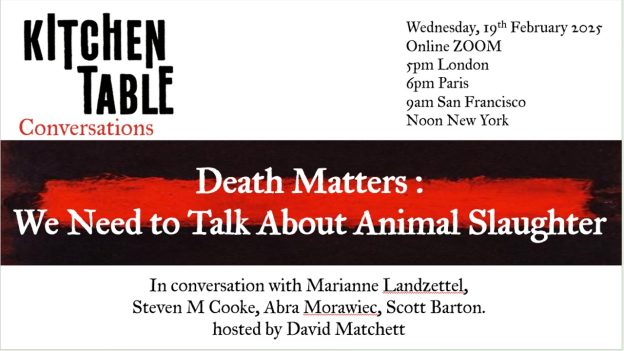
Death Matters : We Need to Talk About Animal Slaughter

Human animals have killed other animals for food for eons, taking a life to sustain another. While the omnivorous diet has seemed part of ‘human nature’ since the dawn of humanity, philosophers and religious thinkers through the ages have questioned whether it is ethical to kill animals for food, and, if we do kill, how should it be done and under what circumstances.
This Kitchen Table Conversation will explore how different cultures, religions, and societies view animal slaughter. What moral obligations do we have towards animals? Do animals have rights? How should their sentience influence our treatment of them? What methods are used to ensure animals are slaughtered humanely? Are these methods effective and consistently applied? Can we minimize pain and suffering for animals during slaughter?
Raising animals for food has become more fraught with burgeoning concerns about the environmental impact of animal husbandry. How do political decisions impact animal welfare and slaughter practices? What laws and regulations govern animal slaughter? How are these enforced? Are there ways to make animal slaughter more sustainable? What alternatives exist?
Our selected conversationalists Marianne Landzettel, Steven M Cooke, Abra Morawiec, and Scott Barton, will begin to explore this rich and timely topic, and we hope you will share your thoughts by registering for a ticket to join the Conversation.
Hosted by David Matchett
Marianne Landzettel is a journalist, writing and blogging about the food systems in the UK, Germany and the US. Her most latest book is 'The Sustainable Meat Challenge – How to graze cattle, slaughter humanely and stay profitable;' previous publication is 'Regenerative Agriculture: Farming with Benefits. Profitable Farms. Healthy Food. Greener Planet. Marianne was UK and Ireland correspondent for German Public Radio, where she started her career as a reporter for the farming program. From 2003 until 2013 she worked for the BBC World Service. @mlandzettel.bsky.social LondonCowGirl (@m.landzettel)
Dr Steve Cooke is Associate Professor of Political Theory at the School of History Politics and International Relations, Leicester University, working in the field of moral and political philosophy. He specialises in justice for nonhuman animals and in the ethics of different forms of protest and activism. Previously, Steve was a University Teaching Fellow in Theory and Animal Rights at Sheffield and a Teaching Fellow in Environmental Politics at Keele. He was the Society for Applied Philosophy’s 30th Anniversary Research Fellow, awarded for a research project on animal rights and environmental terrorism. His PhD was on the ethics of animal liberation. Currently, Steve is exploring the ethical status of slaughterhouse vigils as forms of protest, as well as moral dimensions of lab-grown animal products.
Steve has published most recently in The Journal of Ethics, Journal of International Political Theory, Politics, Journal of Political Philosophy, Environmental Values, Global Ethics, and Political Studies.
Abra Morawiec and her life partner Chris Pinto grow and care for pasture raised specialty poultry at their farm Feisty Acres in upstate New York’s Schoharie County. Working on a Community Supported Agricultural model, their flocks include quail, French Guinea fowl, Silkie chicken, heritage breed ducks, heritage breed chickens and heritage breed turkeys. Since relocating from Long Island’s North Fork to upstate New York in 2023, Feisty Acres hopes to expand into raising small ruminants and pigs.
Scott Alves Barton is a Cultural Anthropologist of African Diaspora Foodways at Notre Dame, and was an executive chef for over 25 years. For nearly twenty years, Scott has researched sacred and profane foodways in Afro-Brazilian communities of northeastern Brazil. He has given acute focus to street food vendors, and the sacred cookery of Candomblé, Tambor de Mina adherents. Scott is a public scholar/artist at Lynden Sculpture Garden, Milwaukee. His forthcoming manuscript, Reckoning with Violence and Black Death follows his Lynden exhibition on Anti-Black violence, funerary foods and ancestrality, Buried in the Heart. Scott serves on several foodways advisory boards
